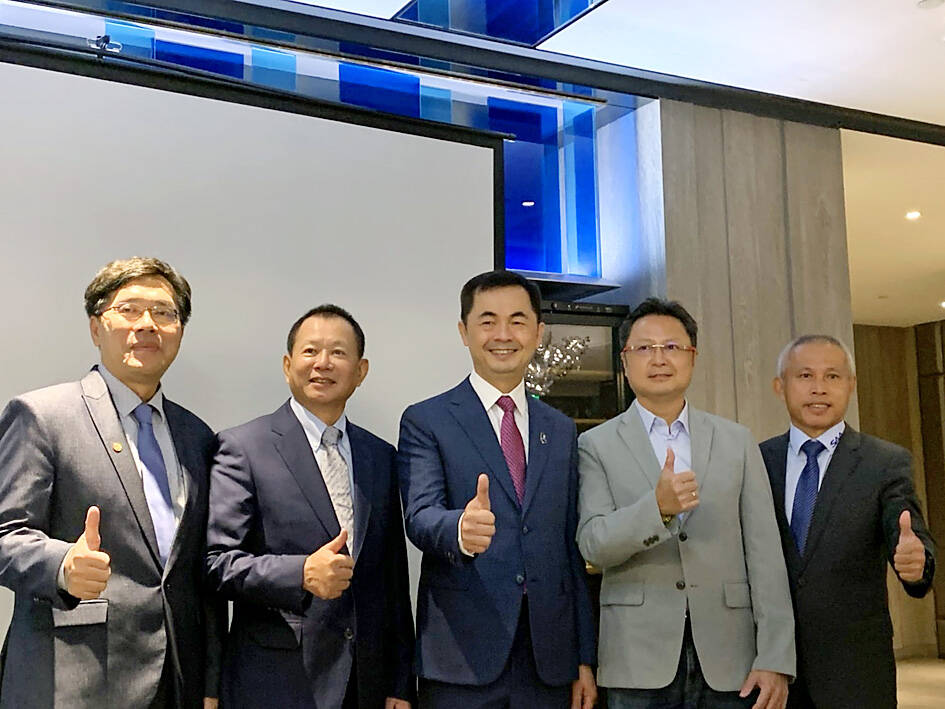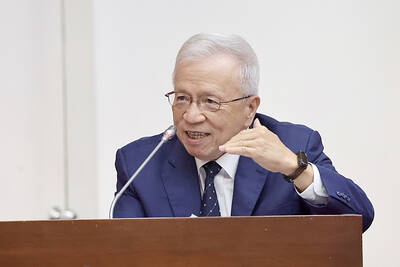Gudeng Precision Industrial Co (家登精密), a key supplier of extreme ultraviolet (EUV) pods to Taiwan Semiconductor Manufacturing Co (TSMC, 台積電), yesterday said it is positive about growth for the next 18 months, as demand is expected to spike after its major customer’s 3-nanometer chip begins mass production later this year.
The consumption of EUV pods should increase rapidly in tandem with upgrades of process technologies, as more EUV layers would be used. Chipmakers use eight times more EUV pods for 3-nanometer process technology than for 7-nanometer technology, Gudeng said.
Based in New Taipei City’s Tucheng District (土城), Gudeng is the world’s largest EUV pod supplier, with a market share of 80 percent.

Photo: Grace Hung, Taipei Times
“We have clear order visibility until the second half of next year,” Gudeng chairman Bill Chiu (邱銘乾) told a media briefing. “We believe that revenue in the second half of this year will be better than in the first half. This will be a quite good year, and revenue should grow further next year.”
Gudeng said its revenue growth would not be affected by a key customer’s EUV tool adjustments, providing some relief to its production lines since the company’s capacity has been full for the past two years, it said.
Media reports last week said TSMC was shutting down several EUV machines in response to faltering customer demand.
However, a person within the supply chain said on condition of anonymity that TSMC is upgrading its EUV machines to cope with fast-growing demand for advanced chips.
Gudeng yesterday said that front-opening unified pod (FOUP) business provides a second growth source for its revenue this year and next.
As Chinese chipmakers accelerate new factory construction to reach self-sufficiency amid an intensifying trade dispute with the US, demand for Gudeng’s 12-inch FOUPs is spiking, Chiu said.
Gudeng, which commands a 40 percent share of China’s FOUP market, expects FOUP revenue to grow up to 40 percent year-on-year, Chiu said, adding that similar growth is expected next year.
The box-like FOUPs are used to ship, transport and store 12-inch wafers, which are unloaded from the FOUP within processing equipment to keep the wafers sterile. EUV pods are used to carry reticles when EUV tools are utilized to produce chips.
Gudeng reported that revenue last month grew 119 percent to NT$400 million (US$12.96 million) from NT$198 million in August last year. That brought the company’s revenue for the first eight months of the year to NT$2.81 billion, soaring 67.23 percent from NT$1.68 billion during the same period last year.
Separately, semiconductor equipment supplier Symtek Automation Asia (迅得機械) said that it is positive about revenue growth prospects for this year and next.
The company expects revenue to expand about 14 percent year-on-year to NT$5.6 billion, from about NT$4.9 billion last year. It aims to grow revenue by 15 percent annually next year.
“We have received NT$3 billion of orders for delivery next year,” company president Jordan Wang (王年清) told the same news conference yesterday.
To satisfy customer demand, the company plans to spend about NT$1.8 billion to build a new factory in Taoyuan’s Jhongli District (中壢), Wang said, adding that it is to start operations at the end of 2024.
Symtek counts TSMC, ASE Technology Holding Co (日月光投控) and Zhen Ding Technology Holding Ltd (臻鼎), the world’s biggest flexible printed circuit board maker, among its major clients.

JITTERS: Nexperia has a 20 percent market share for chips powering simpler features such as window controls, and changing supply chains could take years European carmakers are looking into ways to scratch components made with parts from China, spooked by deepening geopolitical spats playing out through chipmaker Nexperia BV and Beijing’s export controls on rare earths. To protect operations from trade ructions, several automakers are pushing major suppliers to find permanent alternatives to Chinese semiconductors, people familiar with the matter said. The industry is considering broader changes to its supply chain to adapt to shifting geopolitics, Europe’s main suppliers lobby CLEPA head Matthias Zink said. “We had some indications already — questions like: ‘How can you supply me without this dependency on China?’” Zink, who also

At least US$50 million for the freedom of an Emirati sheikh: That is the king’s ransom paid two weeks ago to militants linked to al-Qaeda who are pushing to topple the Malian government and impose Islamic law. Alongside a crippling fuel blockade, the Group for the Support of Islam and Muslims (JNIM) has made kidnapping wealthy foreigners for a ransom a pillar of its strategy of “economic jihad.” Its goal: Oust the junta, which has struggled to contain Mali’s decade-long insurgency since taking power following back-to-back coups in 2020 and 2021, by scaring away investors and paralyzing the west African country’s economy.

Taiwan Semiconductor Manufacturing Co (TSMC, 台積電) received about NT$147 billion (US$4.71 billion) in subsidies from the US, Japanese, German and Chinese governments over the past two years for its global expansion. Financial data compiled by the world’s largest contract chipmaker showed the company secured NT$4.77 billion in subsidies from the governments in the third quarter, bringing the total for the first three quarters of the year to about NT$71.9 billion. Along with the NT$75.16 billion in financial aid TSMC received last year, the chipmaker obtained NT$147 billion in subsidies in almost two years, the data showed. The subsidies received by its subsidiaries —

BUST FEARS: While a KMT legislator asked if an AI bubble could affect Taiwan, the DGBAS minister said the sector appears on track to continue growing The local property market has cooled down moderately following a series of credit control measures designed to contain speculation, the central bank said yesterday, while remaining tight-lipped about potential rule relaxations. Lawmakers in a meeting of the legislature’s Finance Committee voiced concerns to central bank officials that the credit control measures have adversely affected the government’s tax income and small and medium-sized property developers, with limited positive effects. Housing prices have been climbing since 2016, even when the central bank imposed its first set of control measures in 2020, Chinese Nationalist Party (KMT) Legislator Lo Ting-wei (羅廷瑋) said. “Since the second half of